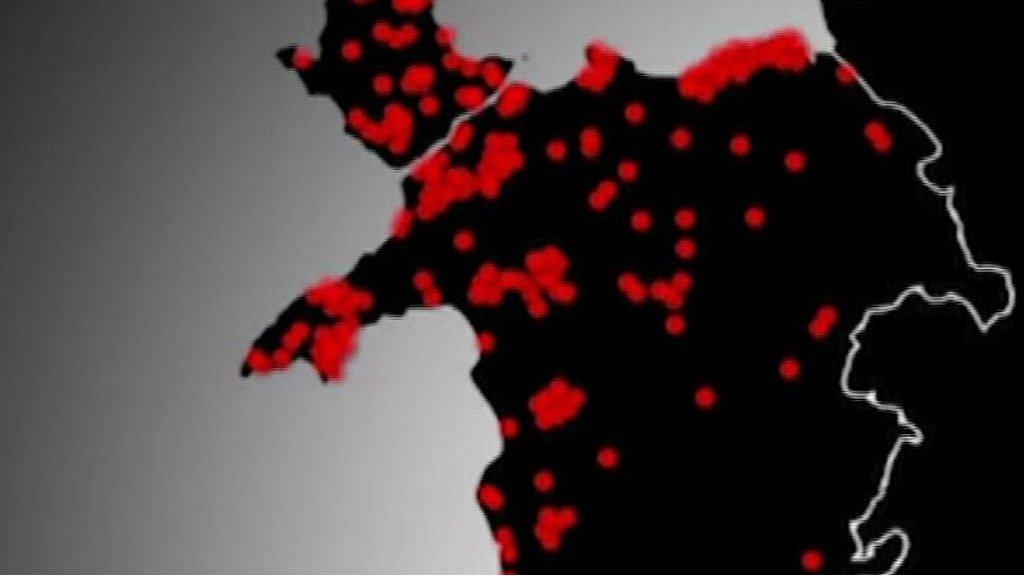Second homes: Meibion Glyndwr firebomber admits 1980s attacks
- Published
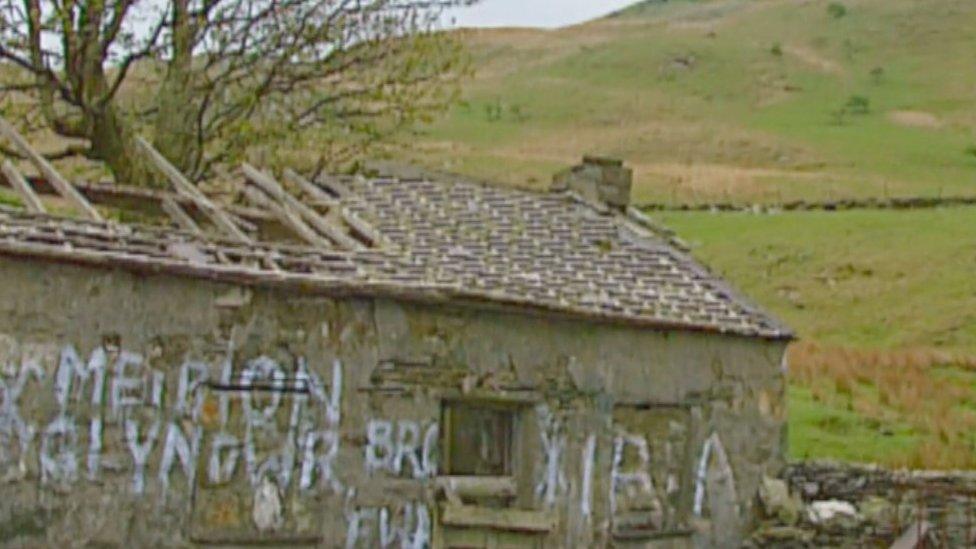
The firebombing campaign lasted from 1979 until the early 1990s
A convicted firebomber has admitted for the first time how he was involved in burning down cottages 30 years ago.
Sion Aubrey Roberts, from Anglesey, described how he was part of Meibion Glyndwr, which set fire to 200 English-owned holiday homes in the 1980s.
During a 12-year campaign, Westminster and English cities were also targeted.
Nobody was ever convicted of being a member, while it is alleged officers tried to gain a false testimony that MP Dafydd Elis-Thomas was involved.
Roberts described how he had a poster of IRA hunger striker Bobby Sands on his wall as a child, and that his first order on joining Meibion Glyndwr was to "break into a house and burn it".
While he was jailed aged 20 for 12 years in 1993 for sending incendiary devices in the post and possessing explosives, police were not able to prove he was part of the wider conspiracy.
But he admitted his full involvement on BBC documentary series Firebombers, saying: "The movement was five years old when I joined.
"Growing up, Meibion Glyndwr were my heroes. We couldn't afford to buy houses in our own area, it was impossible.
"As more and more were being sold, prices kept going up, and local people couldn't afford them.
"We agreed one thing - something had to be done and we had to strike."
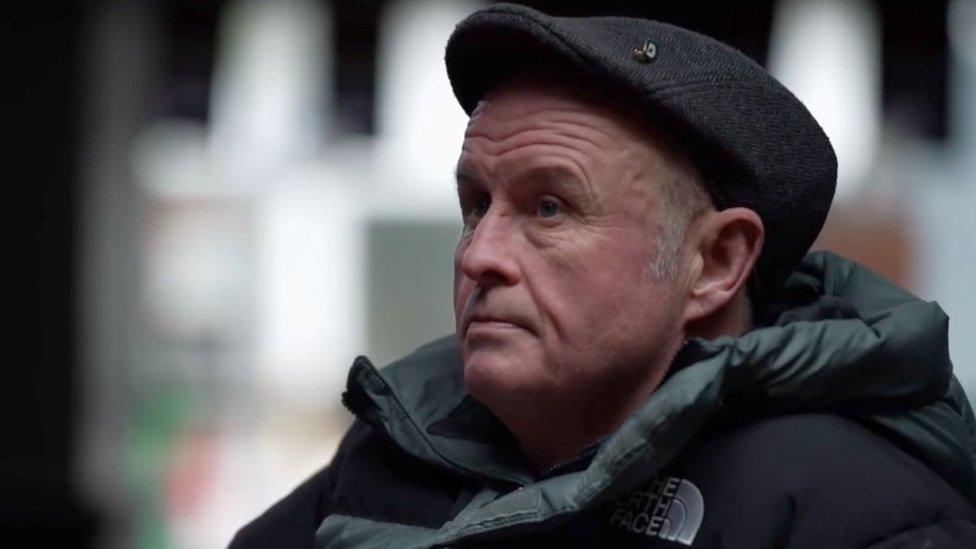
Sion Aubrey Roberts described targeting a holiday home alongside two other men
As the campaign gained widespread publicity in the 1980s, Roberts said "police were watching everywhere", but by using timers on devices, the firebombers could evade arrest.
"We were off the road by nine at night, we weren't at it late at night," he said.
"We didn't want to draw attention to ourselves. It was hours before they caught fire."
He said they had "disappeared" by the time the holiday home was alight, adding: "We were just shadows."
These are what police were chasing from the first two attacks in Pembrokeshire on 13 December 1979 until the early 1990s, according to former BBC journalist Alun Lenny.
He described finding out who was behind Meibion Glyndwr (Sons of Glyndwr) as something that would have been "one of the greatest journalistic scoops".
But he said it was "impossible" to even get a lead.
Meibion Glyndwr: Wales' decade of fire bomb attacks
The first victim of arson attacks, Pembrokeshire-based cottage rental business owner Leonard Rees, said: "The whole property had gone up in flames. It incinerated remarkably quickly.
"The whole roof was consumed and collapsed along with the internal floors."
A further two properties were targeted on 13 December 1979, with three more in Blaenau Ffestiniog, Gwynedd, the next day.
Within six weeks, 17 second homes in north and west Wales had been destroyed, and police now warned all those owned by English people were at risk.
"It was total devastation," said Kelvin Griffiths, who was a North Wales Police officer.
"Because they were so remote, these houses were burning down unbeknown. It was only when someone drove past and thought 'oh the house has been burnt down'. Nobody had even seen it."

The remoteness of properties in counties such as Gwynedd made it easier for the group to carry out the attacks
He described it as a "nightmare" for policing, adding: "The percentage chance of getting caught was zero and they knew it."
Tourism had boomed post-war, with visitors, often from wealthy parts of England, starting to buy holiday homes in what were predominantly Welsh-speaking areas.
By 1978 this had become a problem, according to activist Adrian Stone, with villages empty for large parts of the year.
"Suddenly there wasn't a post office, pubs were closing, suddenly houses that maybe people's grandfathers and grandmothers had lived in were being sold to people who behaved with a lot of cultural insensitivity," he said.
In the next decade, second homes would number 20,000, according to Welsh Office figures, with 50,000 people on the council house waiting list.
Attacks increased, with 20 in just over three weeks in February 1980.
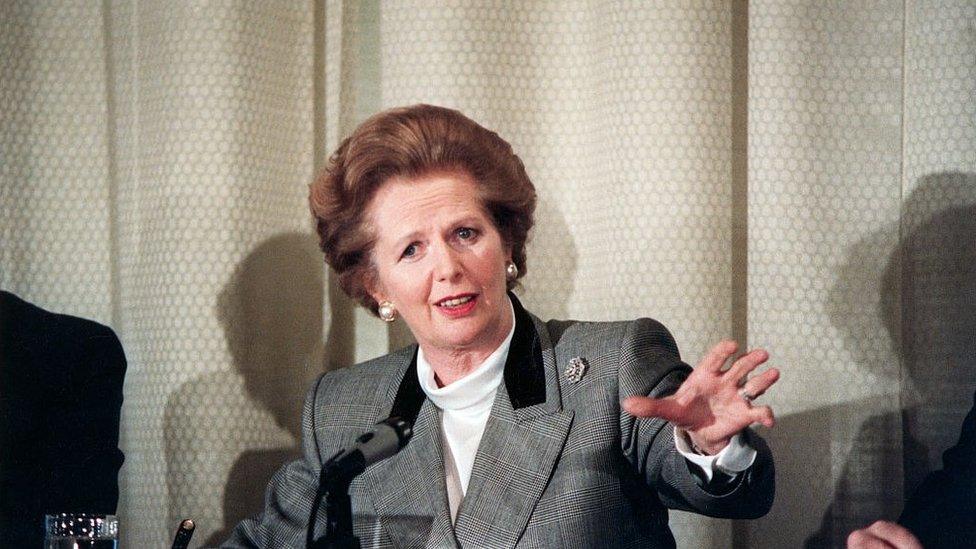
Members of British Prime Minister Margaret Thatcher's Conservative party were targeted
Margaret Thatcher was now in power, and bombs unsuccessfully targeted Tory offices in Porthmadog and Shotton, Flintshire, as well as the home of Welsh Secretary Nicholas Edwards in Abergavenny, Monmouthshire.
More than 50 people were arrested, most released without charge, as police tried to find who was responsible, and Mr Stone went on trial along with others believed to be members of organisation Workers Army for a Welsh Republic.
"They wanted Dafydd Elis-Thomas who was an MP at the time," he said.
"They wanted me to say quite untruthfully that Dafydd was head of the second home campaign."
While two men were found guilty of being in possession of detonators, there was no evidence anyone was part of the wider campaign.
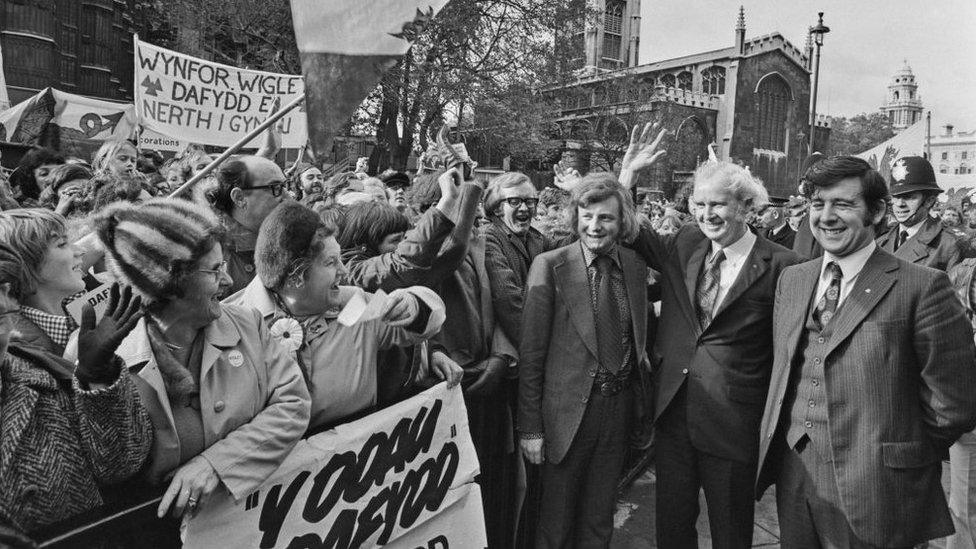
Dafydd Elis-Thomas (left) - with other Plaid Cymru politicians Gwynfor Evans and Dafydd Wigley in 1974 - was mentioned in police interview, according to Adrian Stone
Responding to Mr Stone's allegation, South Wales Police said: "Investigations then were totally different.
"Today's investigations are supported by technology, forensic evidence, disclosure rules and safeguards."
By the mid 1980s more than 100 properties had been firebombed, including one owned by Ben Davies' family - who described his mother being in tears after it was attacked.
"Obviously we didn't have a lot of sympathy for the people who did it, we thought it was grossly unfair, rather cowardly, burning people's property while they weren't there," he said.
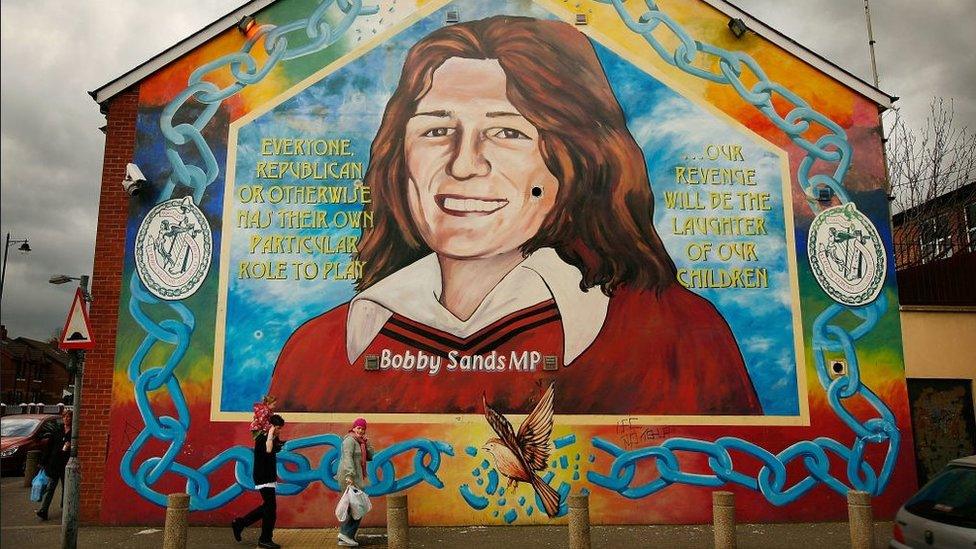
There is a mural of Bobby Sands in Belfast - he was an Irish Republican who died in prison in 1981 after a 66 day hunger strike
Roberts, who joined Meibion Glyndwr around 1984, said Thatcherism was why so many people were inspired to join the movement.
"In 1979, Wales voted four to one against devolution, and Thatcher had taken over," he said.
"It was the Thatcher effect in the 80s that created people like me. I started with the Welsh Language Society but I knew that was not going to be enough for me.
"I wanted to do something far more than that."
He described going on protest marches while growing up in an Irish family in Gwalchmai, Anglesey.
"Even when I was 10 years old, I had pictures of the hunger strikers on my bedroom wall," he said.
"Bobby Sands talks about the 'undauntable thought', the thought that says you're right, the conviction that you know what you're doing is right.
"That's why there's no fear."
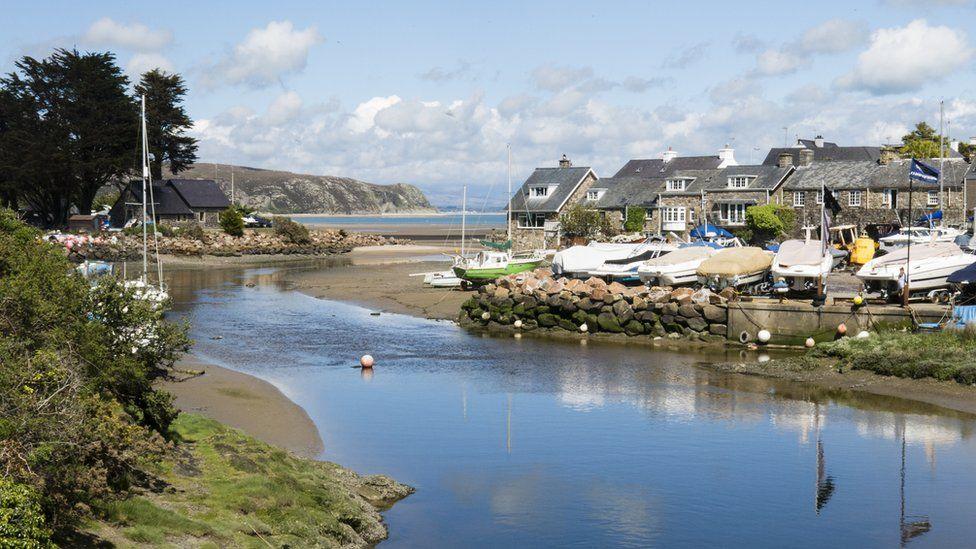
The population of Abersoch, in Gwynedd, jumps from 600 to 30,000 in summer
Attacks were set to move into England, and Roberts added: "In any campaign, you have to adapt.
"Once a hundred or so had gone up, it's not news, is it?"
In February 1988, three bombs went off at estate agents in Chester, with another 20 following in places including Warrington, Bristol and Cheshire.
Julian Beresford Adams - whose company was targeted - said 85% of his sales in Abersoch, Gwynedd, were second homes.
Dozens of businesses were targeted in the town between 1988 and 1990.
"At the end of the day people are born in one area and a lot of people don't end up being there because they can't afford to be there. That's life," he said.
"That's nothing to do with second homes."
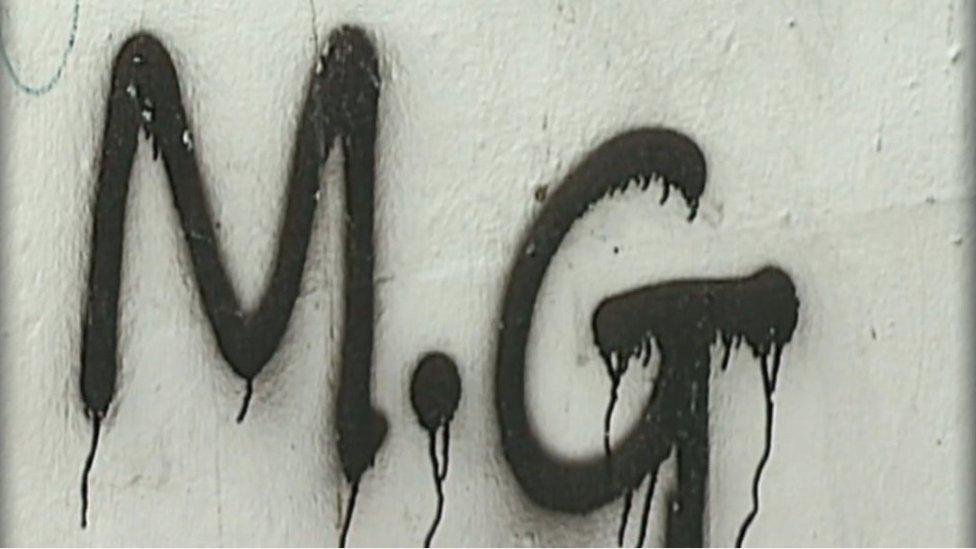
Graffiti had appeared in rural Wales during the 10-year period of the campaign
With nobody charged for being part of Meibion Glyndwr, singer Bryn Fôn - who wrote a song about the movement - said the police's attempts to identify members became viewed as a "farce".
"After 10 years of investigating, all they had to show was a plimsoll and cagoule that everyone wore," he said.
"Everyone was talking about the police and everyone was laughing at them across the country, so I thought I'd crystallise that feeling.
"I just thought it was a farce."
When a device was allegedly found in the dry stone wall of his home he was arrested, along with his partner, and questioned for more than 50 hours before being released without charge.
The whole thing "stank", he said, with it never discovered who planted it.
In summer 1990, suspect packages were sent to Westminster for three Tories, including Welsh secretary David Hunt.
Pembroke MP Nicholas Bennett said a package "would've blown my head off" had he opened it, adding: "It is terrorism pure and simple."
"One device in London was worth more than 50 devices in north Wales," Roberts said.
"You'd get more publicity from it and that was the whole point."
In 1991, a breakthrough came. Roberts, David Gareth Davies and Dewi Prysor Williams were all arrested after being filmed at a protest march in uniform.
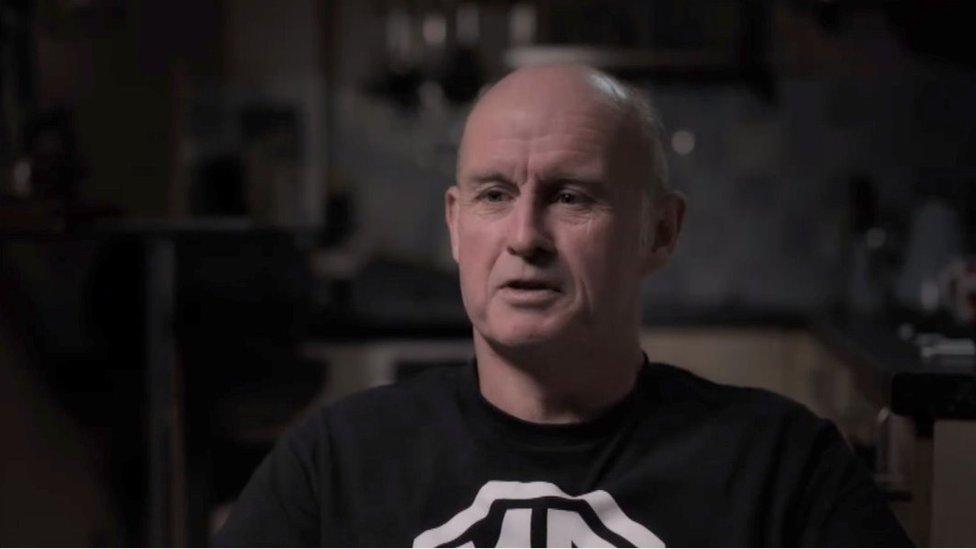
Sion Aubrey Roberts was cleared of being part of the Meibion Glyndwr movement, a charge that would have carried a longer prison sentence
January 1993 saw the three men appear at Caernarfon Crown Court for what would eventually be a 40-day trial.
Prosecutors said Roberts had been seen in forensic clothing and assembling devices, but the defence questioned the accuracy of surveillance and found inconsistencies in MI5 reports.
All three were found not guilty of the conspiracy, but a jury did find Roberts guilty of sending four incendiary devices in the post and possession of explosive substances. He was sentenced to 12 years in prison.
"You have to be ready to go to jail before you start," he said.
"If I'd been convicted of conspiracy, I'd have got 25 years. I thought I'd be out in eight years, that isn't too bad."
No Meibion Glyndwr attack has happened since Roberts' conviction.
He was eight when the firebombings started, and so was not a ringleader. He has instead been described by some journalists as "a foot soldier".
Former reporter Alun Lenny said he doubts the identities of others who were involved will ever be revealed.
"We may never know who any of them are unless we get a deathbed confession from someone," he said.
"But Meibion Glyndwr, like Owain Glyndwr who they get their name from, have disappeared into the mists of history."
- Published3 January 2017
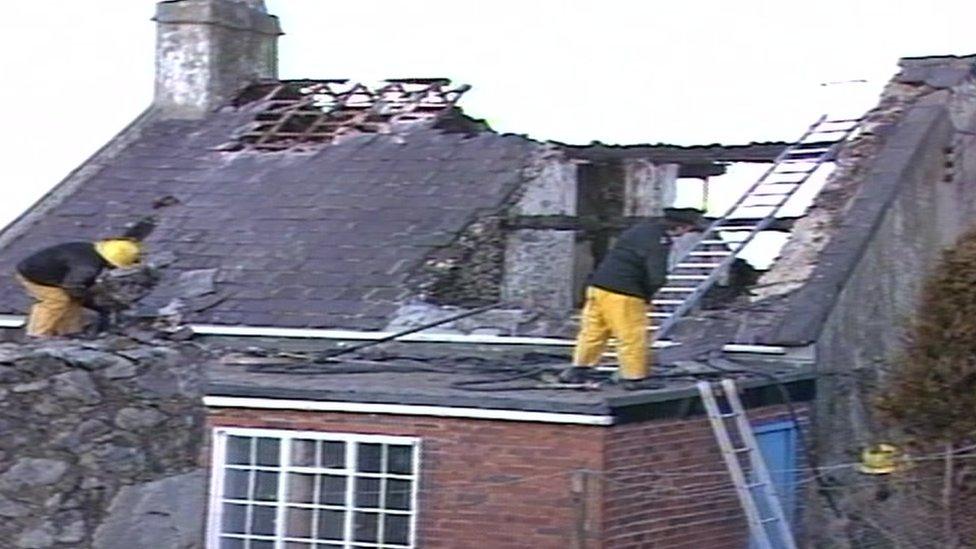
- Published12 April 2023
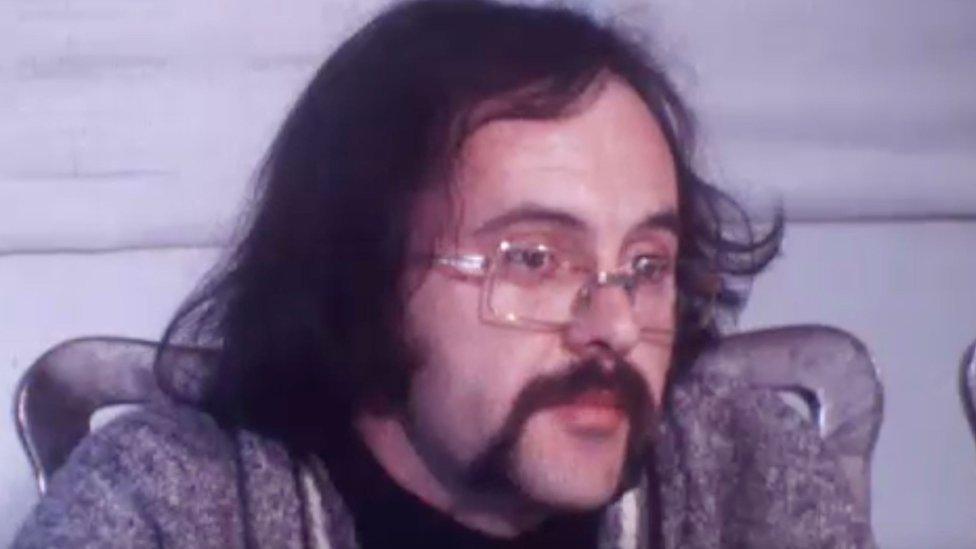
- Published16 March 2017
